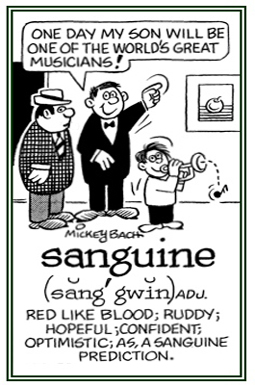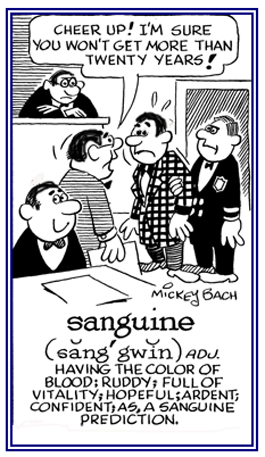sangui-, sanguio-, sanguin-
(Latin: blood)
2. A reference to someone who believes he or she needs to consume blood to maintain her or his health.
2. Marked by eagerness to resort to violence and bloodshed.
2. Accompanied by bloodshed: There was a sanguinary boxing match which was very violent.

Go to this Word A Day Revisited Index
so you can see more of Mickey Bach's cartoons.
3. Eager for bloodshed; bloodthirsty: There were sanguinary attacks on cattle by vampire bats that were gorging for the red fluid in the veins of the cows and bulls.

Although many dictionaries indicate that sanguine means "bloody", since it is derived from a Latin origin meaning "bloody" or "full of blood", it is now rare that anyone uses it in that sense any more.
2. Of or pertaining to the red fluid that flows in the body: Sharon was told that her sanguine complexion meant that she had a healthy supply of blood flowing through her veins.For more historical background information about sanguine, see the article at the bottom of this page.


Go to this Word A Day Revisited Index
so you can see more of Mickey Bach's cartoons.
The similarity in form between sanguine, "cheerfully optimistic", and sanguinary, "bloodthirsty", may prompt people to wonder how these words have resulted in such different meanings.
The explanation lies in medieval physiology with its notion of the four humors or bodily fluids (blood, bile, phlegm, and black bile). The relative proportions of these fluids was thought to determine a person's temperament.
If blood was the predominant humor, then that person had "a ruddy face and a disposition marked by courage, hope, and a readiness to fall in love".
Such a temperament was called sanguine, the Middle English ancestor of the modern word sanguine. The source of the Middle English word was Old French sanguin, itself from Latin sanguineus.
Both the Old French and Latin words meant "bloody, blood-colored". Latin sanguineus was in turn derived from sanguis, "blood", just as the English "sanguinary" is.
The English adjective sanguine, was first recorded in Middle English before 1350, and it continues to refer to the "cheerfulness" and "optimism" that accompanied a sanguine temperament but it no longer has any direct reference to medieval physiology.
2. Inclined to a healthy reddish color often associated with outdoor life.
2. Full-blooded; sanguine; that is, hopeful.
3. A reference to the color of blood.
2. A blood sucker.
2. Tinged, or mingled, with blood; bloody; such as, sanguinolent sputa.
2. The formation of red blood cells in the blood-forming tissues of the body. 3. The production of all types of blood cells generated by a self-regulated body system that is responsive to the demands put upon it.


